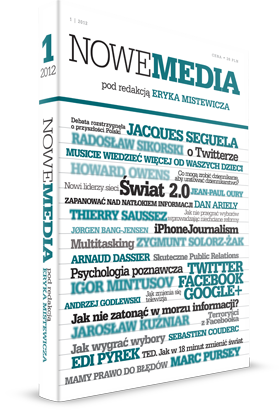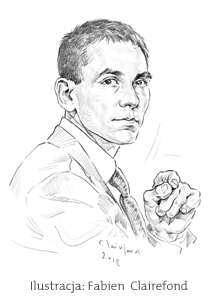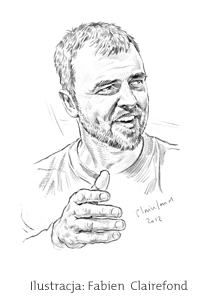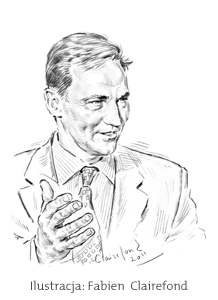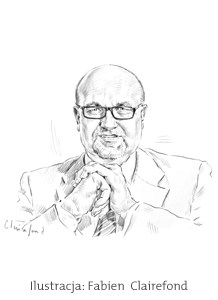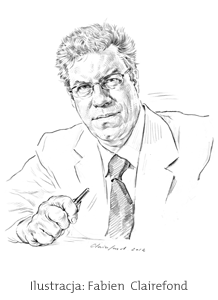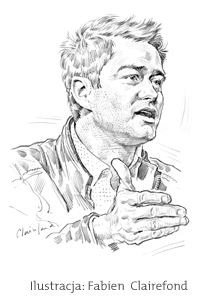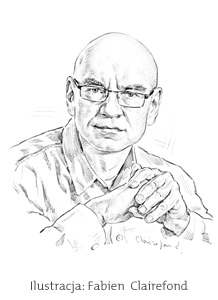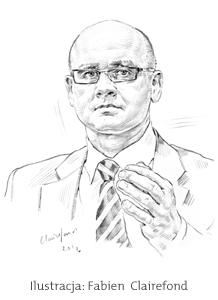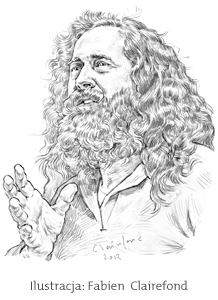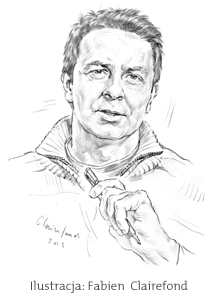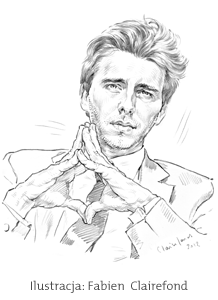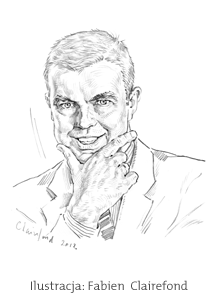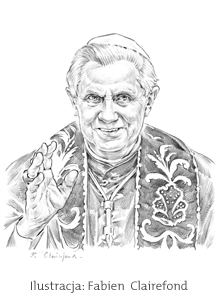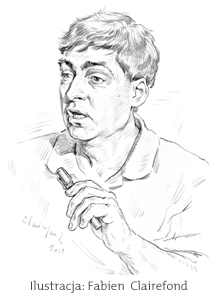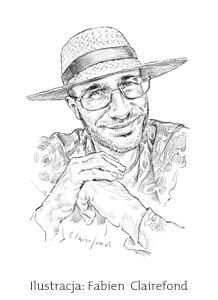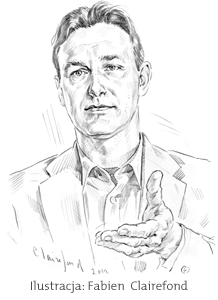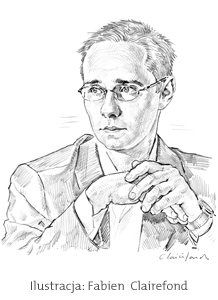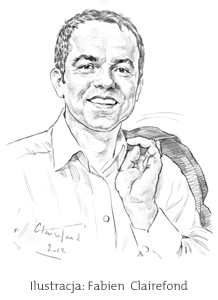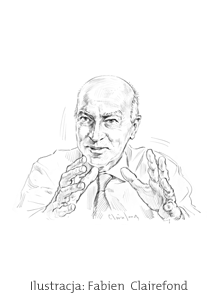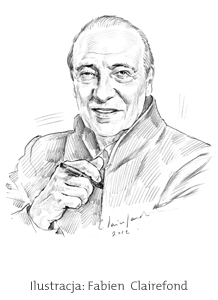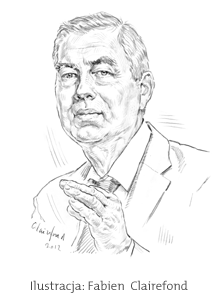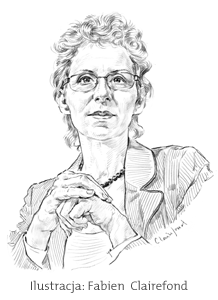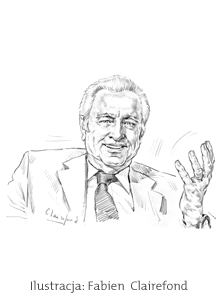Nowe Media nr 1
(1/2012)
Nigdy dotąd Zmiana nie była tak gwałtowna. Nigdy dotąd tak wiele informacji nie wymagało od nas przetworzenia. Nigdy dotąd nie szukaliśmy szans na to, aby nie utonąć w morzu wiadomości, a jednocześnie wiedzieć to, co ważne. Nigdy też dotąd nowości nie było więcej, niż szansa na choćby przez chwilę dotknięcie, poznanie, zrozumienie każdej z nich. Kilka sekund ma nowy wynalazek na to, aby nas zainteresować. I już pojawia się następny. Kilka sekund ma nowa technologia, aby przykuć uwagę. Jeśli w ogóle jeszcze sformułowanie „przykuwanie uwagi” ma sens. Ludzie reklamy, marketingu, PR przyznają: wszystko, co poznaliśmy dotąd, już nie działa.
Nasi dziadkowie w ciągu roku dostawali tyle informacji, ile my w ciągu jednego dnia. Spotykali w ciągu tygodnia może dwie, trzy nowe osoby. Długo rozmawiali. Wsłuchiwali się w słowa księdza, nauczyciela, szefa gminy, naczelnika policji, szefa straży pożarnej. Czasami czytali gazetę. Jedną, może dwie. W stanie wojennym mogli wybierać dwie. Poza stanem wojennym: najwyżej dziesięć. Do tego dziesięć tygodników, dwadzieścia, trzydzieści wyspecjalizowanych miesięczników. I to wszystko. Dwa programy telewizji. Cztery programy radia. Można było wszystko przeczytać, porozmawiać z rodziną i przyjaciółmi. Drogi relacji społecznych, osiągania sukcesu w życiu osobistym, w biznesie były oczywiste. Nauczenie się „raz a dobrze” wystarczyło, aby „wiedzieć”. Nie trzeba było się „douczać”, śledzić trendów. Raz nauczony dziennikarz był – podobnie jak tokarz – nauczony swego zawodu. Nie musiał niczego zmieniać. Nauczyciel też. Polityk również. Menedżer także. Przecież zasady się nie zmieniają.
I otóż się zmieniają. Świat przyspieszył właśnie za sprawą informacji. Nie sposób już wiedzieć wszystkiego, wszystkiego przeczytać, obejrzeć wszystkich programów telewizyjnych, wysłuchać wszystkich wiadomości radiowych, przejrzeć wszystkich serwisów internetowych.
Spis treści
Debata: Zmiana 2.0 | Pochwała nieracjonalności |
Bezmarketing | TED – w 18 minut zmieniamy świat |
Twitter – użyteczne narzędzie osiągania swoich celów | Czas na rytualizację marek? |
Dziesięć mitów Twittera | Marketing w IT: ciągła zmiana |
Co mogą zrobić dziennikarze, aby uratować dziennikarstwo? | Kto jest w sieci liderem opinii? |
Tłum nigdy nie będzie mądrzejszy od jednostki | ROI – król oszustów |
Dziennikarstwo przetrwa | Jak skutecznie komunikować najtrudniejsze reformy? |
Może są straszni, ale są Tobie potrzebni | Debata: Jak wygrać wybory? |
Prawo do czytania | Debata, która rozstrzygnęła o przyszłości Polski |
Autorze! Wydaj się sam! | O polskie Wembley |
Moja muzyka nie zna granic | Hagada – siła opowieści |
Jak zmienia się telewizja | Story, czyli opowieść tubylców australijskich o sobie i świecie, w którym żyją |
„Milczenie jest integralną częścią komunikacji” | Jak być kreatywnym? |
Warto przeczytać |
Debata: Zmiana 2.0, Jørgen BANG-JENSEN, Tomasz CZECHOWICZ, Beata MOŃKA, Eryk MISTEWICZ, Cezary SMORSZCZEWSKI, Zygmunt SOLORZ-ŻAK
XXI Forum Ekonomiczne w Krynicy to najpoważniejsze miejsce dyskusji o technologicznej innowacji i wpływie cyfryzacji na nasze życie. Dyskutowaliśmy o Zmianie 2.0 z praktykami biznesu: Beatą Mońką (Cyfra +), Tomaszem Czechowiczem (MCI Management), Jorgenem Bang-Jensenem (Play), Cezarym Smorszczewskim (Alior Bank) i Zygmuntem Solorz-Żakiem (prezes Polsatu). Debatę poprowadził Eryk Stankunowicz (Forbes).
ABSTRACT: Change 2.0 is the time of change enforced by technological development in the debate of presidents of innovative IT, media and telecommunications companies during the 21st Economic Forum in Krynica. For companies the time of change is, above all, the time of challenges and preparation for innovations. However, the change concerns the manner in which the human brain functions when subject to the pressure of a flood of information. It enforces change in communication, marketing, advertising and PR. Thanks to technological changes, we know more about human that we knew before. Geolocalization may constitute a significant determinant for marketing actions in the nearest future.
RESUME: Le changement 2.0, soit le temps du changement généré par le progrčs technique, dans le débat des présidents des sociétés innovantes du secteur IT, des médias et des télécommunications, durant le XXI Forum Economique de Krynica. Le temps du changement constitue avant tout le temps des défis pour les entreprises et de la préparation aux innovations. Mais le changement concerne également la façon dont réagit le cerveau humain soumisŕ la pression de nombreuses informations qui l’attaquent. Ceci implique un changement dans la communication, dans le marketing, dans la publicité et dans les relations publiques. Le progrčs technique quant ŕ lui fait que notre connaissance de l’ętre humain est meilleure qu’auparavant. La géolocalisation peut constituer un important facteur déterminant l’activité marketing dans un proche avenir.
Bezmarketing, Scott STRATTEN
Prezes UnMarketing.com oraz ekspert w obszarze marketingu szeptaneg o i społecznościowego. Jest ekspertem w tak renomowanych serwis ach , jak Mashable.com i CNN.com. Piszą o nim „Wall Street Journal”, „USA Today” oraz „FastCompany”.
Wirusowe materiały wideo opracowane na zlecenie jego klientów zostały wyświetlone ponad 60 milionów razy i wygenerowały bardzo duże przychody. W swej ostatniej książce („Bezmarketing”, wyd. w Polsce Helion/OnePress) doradza, jak firmy mogą skutecznie budować relacje z wykorzystaniem mediów społecznościowych… oraz starej dobrej sztuki rozmawiania. Inspirujące!
ABSTRACT: The use of social networking media or virus marketing does not change the basic principles governing communication, which, after all, is an art of conversation. Decisions taken in marketing always involve new fields, experimenting, the courage of taking decisions against the habits, the best possible knowledge of the consumer and reaching out to him, asking about his needs and observations. Yet trifles or lack of attention to detail may destroy the best prepared marketing strategy.
RESUME: L’exploitation des médias sociaux ou du marketing viral ne modifieenrien les règles de base auxquelles nous nous conformons dans la communication, qui après tout est un art de conversation. Toutes les décisions qui sont prises dans le domaine du marketing relèvent des champs nouveaux et des expériences. Elles relèvent aussi du courage pour prendre des décisions qui vont à contre-courant des habitudes, de la meilleure connaissance du consommateur pour aller au maximum à sarencontre et s’interroger sur ses besoins et ses remarques. Cependant des petites choses ou le manqué d’attention aux détails peuvent détruire toute stratégie de marketing, même celle préparée au mieux.
Twitter – użyteczne narzędzie osiągania swoich celów, Radosław SIKORSKI
Polityk, wiceprzewodniczący Pl atformy Obywatelskiej , Minister Spraw Zagranicznych.
62 prezydentów lub premierów z 49 krajów aktywnie publikuje w serwisie mikroblogowym Twitter. Serwis ten promuje polityków z charyzmą. Wzorcem sposobu wykorzystania Twittera przez polityków w świecie jest Barack Obama. W Polsce: Minister Spraw Zagranicznych Radosław Sikorski.
ABSTRACT: Twitter is a helpful, though risky tool for a politician, enabling him to pursue his own communication policy. It makes a politician independent of media corporations. It allows for an immediate reaction, imposing his own view of events without waiting for a press conference to be held, without waiting for the manner in which his words will be presented by journalists. Twitter frees politicians from dependence on journalists, at the same time giving preference to charismatic politicians, promoting the politicians of the new era. It is a tool of modern diplomacy.
RESUME: Le Twitter est un outil utile pour l’homme politique quoiqu’il soit parfois un peu dangereux. Il lui permet de gérer sa propre politique de communication et le rend indépendant des sociétés de médias, il lui permet de réagir immédiatement, d’imposer sa vision de l’événement, sans attendre une conférence de presse et sans attendre comment ses paroles vont être transmises à l’opinion publique par les journalises. Le Twitter rend les hommes politiques indépendants des journalistes, tout en récompensant ceux d’entre eux qui ont du charisme et il met en valeur des politiques de la nouvelle époque. Le Twitter est un outil de la diplomatie contemporaine.
Dziesięć mitów Twittera, Eryk MISTEWICZ
Konsultant strategii marketingowych . Współautor „Anatomii władzy” (2010), autor „Marketingu Narracyjnego” (2011). Laureat Polskiego Pulitzera, Nagrody Głównej Stowarzyszenia Dziennikarzy Polskich (1995). Promotor narzędzi komunikacji masowej 2.0. Pracuje jako doradca instytucji , firm i osób publicznych.
W biznesie, zarządzaniu, kulturze, sporcie, polityce, a nawet w tworzeniu sieci widzów odwiedzających teatr Twitter sprawdza się jako narzędzie generowania i rozpowszechniania własnych komunikatów, prezentowania własnego zdania, własnej opinii. Sprawdza się także, jak szybko się okazało, jako jedno z narzędzi marketingu narracyjnego.
ABSTRACT: Twitter is the simplest tool for mastering the flood of information while remaining in touch with the pulse of the world. The right choice of persons who follow makes it replace the traditional media. We save time when we can trust that others will draw attention to what is important. Today, Twitter is also a tool for building “one’s own church”, which is used by politicians but also, more and more frequently, representatives of business, artists and sportsmen.
RESUME: Le Twitter est l’outil le plus simple qui permet de gérer la masse d’informations, tout en gardant une liaison courante avec le pouls du monde. Un bon choix de personnes dont le «follow» fait que les médias traditionnels sont ainsi remplacés. Nous gagnons du temps en pouvant se fier aux autres qui en notre lieu et place s’intéressent aux questions importantes. Le Twitter est devenu aujourd’hui un outil pour rassembler ses fidčles, ce dont profitent les hommes politiques et des plus en plus les hommes d’affaires, les artistes ou les sportifs.
Co mogą zrobić dziennikarze, aby uratować dziennikarstwo?, Howard OWENS
Pionier cyfrowych mediów. W 1995 roku współtworzył East County Online, pierwszą amerykańską stronę internetową grupującą treści z tygodników. Od 1999 do 2005 r. dyrektor ds . nowych mediów w Ventura County Star. Prowadzi jeden z najbardziej znanych blogów o dziennikarstwie internetowym.
Jeden z najciekawszych tekstów o współczesnym dziennikarstwie wyszedł spod pióra Howarda Owensa, autora cenionego serwisu o dziennikarstwie internetowym. Warto przeczytać, jak dziennikarze w zmieniającym się świecie mogą zachować swój zawód, wykonując go wciąż z pasją i przekonaniem.
ABSTRACT: The journalist of the future creates his own news site. He builds permanent and ever deeper relations with his addressees. He is authentic, has a passion and dreams. His main role is to tell captivating, fascinating stories to his community. It is his duty to be honest in every situation and to correct the errors of others instead of repeating them.
RESUME: Le journaliste du futur crée son propre site web news. Il construit des relations stables et de plus en plus profondes avec ses lecteurs. Il est authentique, il a une passion et des rêves. Son principal rôle consiste à raconter à sa communauté des histoires excitantes et fascinantes. Son devoir est d’être franc en toutes circonstances et de corriger les erreurs des autres et non pas de les reproduire.
Tłum nigdy nie będzie mądrzejszy od jednostki, Jarosław KUŹNIAR
Dziennikarz TVN24.
Jarosław Kuźniar, dziennikarz TVN24 doświadczył pierwszego w Polsce aktu terroru ze strony portali społecznościowych. Poprosiłem, aby opowiedział o tym ringu w kisielu, na który go wepchnięto. Napisał o sieci, która jest jak broń masowego rażenia. I wcale nie jest mądra, zatraca bowiem naturalne rozróżnienie na mistrza i ucznia. Ważny tekst!
ABSTRACT: The Internet user is like a viewer of ancient Roman duels. His one gesture may lift someone to glory or dump him into the dungeon. What determines a man’s position now is not his work, but the hormones of Internet users. The Web is like a weapon of mass destruction – uncontrollable, and unpredictable in use. The natural differentiation between the master and the disciple is lost. The illiterate criticize writers, the aesthetically blind complain about the works of masters of painting, blacksmiths comment on the work of goldsmiths, and carpenters order Michelangelo around.
RESUME: L’Internaute est comme le spectateur des duels romains. Son seul geste suffit pour élever quelqu’un sur l’autel ou pour le jeter dans un cachot. Le travail de l’individu ne décide plus de sa qualité, désormais place aux hormones des internautes. Le réseau est comme une arme de destruction massive – sans contrôle, sans possibilité de prévoir les suites de son utilisation. On perd la faculté de faire une distinction naturelle entre un maître et un disciple. Les analphabčtes critiquent les écrivains, les aveugles ŕ l’esthétisme se plaignent des grands peintres, les forgerons ratiocinent sur les oeuvres de joaillers et les charpentiers mettent Michel Ange dans un coin.
Dziennikarstwo przetrwa, Dariusz ROSIAK
Publicysta „Rzeczpospolitej”.
„Polski rynek jest w istocie w erze przedinternetowej, zdecydowana większość ludzi czerpie informacje i wiedzę o świecie z telewizji” – to opinia dziennikarza pilnie obserwującego zmiany w jego świecie, w świecie mediów. Dariusz Rosiak dzieli się swymi refleksjami o zawodzie, który – jak twierdzi – przetrwa. Choć zastrzega: może się mylić.
ABSTRACT: The Polish market is still in the pre-Internet era, most people obtain information and knowledge of the world from TV. However, the future of the media is auspicious – a news report, thorough professional information will survive irrespective of technological advancements. The spectrum of reality presentation has been widening. Opinion forming and ideological clarity of the information sources will be appreciated. The Internet is only a tool and the manner of its use still depends on a human being. The Internet is not an aim in itself. Journalism is a profession for people of passion and vocation.
RESUME: Le marché polonais est encore à l’époque pré-internet, la grande majorité des gens tire ses informations et ses connaissances du monde de la télévision, cependant l’avenir des médias n’est pas pessimiste. Le reportage, l’information spécialisée approfondie vont subsister indépendamment du progrès technique. Le spectre de présentation de la réalité devient de plus en plus large. Le caractère influent et la clarté idéologique des émetteurs d’informations seront toujours précieux. L’internet n’est qu’un simple outil et la manière dont il est utilisé continue à dépendre de l’homme. L’internet n’est pas une fin en soi. Le métier de journaliste est toujours destiné aux gens passionnés qui ont la vocation.
Może są straszni, ale są Tobie potrzebni, Sławomir JASTRZĘBOWSKI
Redaktor naczelny „Super Expressu”.
Kto lepiej od szefa tabloidu przedstawi zasady, jakimi kieruje się w podsycaniu zainteresowania wokół osób publicznych, a następnie spychania tychże ukształtowanych często przez nie „celebrytów” w społeczną otchłań? Kto lepiej odpowie na pytanie: jak bronić się przed tabloidami? Kto, jeśli nie redaktor naczelny tabloidu?
ABSTRACT: A handbook for politicians and celebrities on how to avoid being killed by tabloids – written by the main editor of a tabloid, who argues that tabloids, though terrible indeed, are in fact needed by public persons. It is a game to the rules of which we must submit when entering the public space. The game in which we may achieve the most knowing that lawyers will not assist us in it as much as some intelligence and looking at oneself from a distance.
RESUME: Un guide pour les hommes politiques et célébrités qui leur conseille comment ne pas se laisser tuer par des tabloïdes – écrit par le rédacteur en chef d’un principal tabloïde qui essaie de convaincre que certes les tabloïdes sont horribles mais indispensables aux personnes publiques. C’est un jeu dont on accepte les règles dès qu’on entre dans l’espace public. Un jeu où on peut beaucoup gagner en comprenant que ce n’est pas les avocats qui vont nous secourir mais notre intelligence et parfois un peu de distance avec soi-même.
Prawo do czytania, Richard STALLMAN
Ojciec ruchu „wolnego oprogramowania”, założyciel projektu GNU oraz Free Software Foundation.
Są dokumenty w świecie nowych mediów, które znać musimy. Do takich dokumentów należy artykuł Richarda Stallmana z 1997 r., który ukazał się w Communications of the ACM (Vol.40, No.2). Artykuł o tym, jak czytamy, co czytamy, i czy aby nie łamiemy przy tej okazji prawa. Rzecz warta pogłębionej refleksji.
ABSTRACT: The surrealist story of the times which, as it seemed, would never come. However, limitations in the access to the content have been introduced and today there is an ongoing struggle between the concerns who rule the content, and by the way computers and the addressees of the content. The basic question is who really owns the computer, the software, the content stored in the computer: its owner or the computer concern which has taken control of the machine?
RESUME: Un conte surréaliste sur les temps qu’on croyait qu’ils n’allaient jamais arriver. Et pourtant les limites d’accčs aux contenus sont désormais établies et aujourd’hui il y a une lutte entre des grandes sociétés qui gčrent des contenus et par la męme occasion entre les ordinateurs et lecteurs. Une question fondamentale, qui est le propriétaire de l’ordinateur, du software, du contenu de cet ordinateur – celui ŕ qu’ils appartiennent ou une société d’informatique qui a repris le contrôle de la machine.
Autorze! Wydaj się sam!, Piotr LIPIŃSKI
Reporter , pisarz , filmowiec , ostatnio self-publisher . Blisko 20 lat pracował w Gazecie Wyborczej . Autor książek o latach stalinizm u w Polsce „Humer i inni”, „Bolesław Niejasny”, „Towarzysze Niejasnego”, „Raport Rzepeckiego”. Laureat nagrody Prezes a Stowarzyszenia Filmowców Polskich za dokument „Co się stało z polskim Billem Gatesem ?”. W grudniu ubiegłego roku wydał samodzielnie swojego pierwszego e-booka „Piąta Komenda”.
Doświadczenie Piotra Lipińskiego jest doświadczeniem autora, który eksperymentuje, szuka, popełnia błędy, ale przechodzi ze świata XIX wieku do świata XXI wieku; ze świata, w którym zdany jest na domy wydawnicze, do świata, w którym kilka wieczorów przy komputerze pozwala mu wydać książkę. Nie jest informatykiem, jedynie z pasją podchodzi do nowego świata. Dlatego świadectwo to wydało mi się wyjątkowo ciekawe.
ABSTRACT: The authors move from the 19th century world to the world of the 21st century, from the world in which they are confined to publishing houses to the world in which a few nights in front of the computer and “figuring out the system” allows them to publish their own book – without the need for professional IT knowledge. Passion is what matters. Paper editions of books will soon become a rarity, such as a vinyl record is today. Publishers will be unwilling to publish on paper, as it will be too expensive. Authors who are entering 2.0 world today will get there before anyone else.
RESUME: Les auteurs passent du monde du XIXe siècle à celui du XXIe siècle ; du monde dans lequel ils dépendaient des maisons d’édition au monde où quelques soirées passées devant l’ordinateur et «un démantèlement du système » ” leur permettent d’éditer leur propre livre – même sans disposer des connaissances d’un informaticien. La passion est primordiale. Les éditions sur papier vont devenir aussi rares qu’un disc vinyle. Les éditeurs choisiront le papier avec réticence puisque il sera trop cher. Les auteurs qui entrent déjà aujourd’hui dans l’univers 2.0 y seront avant les autres.
Moja muzyka nie zna granic, Igor LIPIŃSKI
Mieszkający w USA kompozytor polskiego pochodzenia, łącz y muzykę ze sztuką iluzji . Ukończył studia Masters of Music z fortepiano i literatury w Eastman School of Music na University of Rochester w Nowym Jorku. Jego amerykański debiut z orkiestrą Buffalo Philharmonic transmitowało National Public Radio, zaś PBS – zwycięski występ podcz as Nowojorskiego Festiwalu Komedii na Broadwayu.
Nowe media to sztuka łączenia wielu aktywności, w przypadku Igora Lipińskiego: muzyki, iluzji, technologii. Oto jego opowieść o tym, jak ominął wielkie studia nagraniowe i wydaje swoje kolejne płyty, a także o tym, jak pasja i zdolność przedzierania się przez przeciwności jest w stanie doprowadzić nas na szczyt. W czasach nowych mediów wydaje się to wręcz łatwiejsze niż wcześniej. Wystarczy spróbować…
ABSTRACT: The way in which musicians share their knowledge is inextricably linked to technological progress. However, in recent times artists have not been at the mercy of great record companies. The Internet, the development of social network services and the increase in music consumption on the Internet have blurred the limit between the great record company and an independent artist. For the first time in history artists may publicize their clips on You Tube and maintain their relationships with fans on Twitter. The Internet has restored the control over their work to artists. The author describes how he released and popularized his record. He argues that today artists, in order to become known, must seek a creative interdisciplinary place for their art in the new media.
RESUME: La manière dont les musiciens partagent leur musique est indissociablement liée au progrès technique. Mais ces derniers temps, les artistes ne dépendent eux non plus des grandes maisons de disques. L’internet, le développement des réseaux sociaux et la croissance de la consummation de musique sur le web ont effacé les frontières entre une petite maison de disques et un créateur indépendant. Pour la première fois dans l’histoire, les artistes peuvent publier sur You Tube leurs propres clips et maintenir des relations avec des fans sur Twitter. L’internet a restitué aux artistes le contrôle de leurs oeuvres. L’auteur décrit comment il a édité et popularisé son disque. Il explique qu- ’aujourd’hui les artistes pour être connus doivent rechercher un lieu créatif et interdisciplinaire pour leurs créations dans ces nouveaux médias.
Jak zmienia się telewizja, ANDRZEJ GODLEWSKI
Zastępca dyrektora Programu 1 TVP S.A.; pracę w mediach elektronicznych rozpoczął w 1995 r., w latach 2004–2006 kierował Redakcją Publicystyki TVP1; ma również duże doświadczenie prasowe – był m.in. szefem działu Opinie „Dziennika” (2006–2007) oraz działów Opinie i Kraj w „Polska The Times ” (2007–2010).
Telewizja nie zginie, choć w kształcie, w jakim dziś ją znamy, możemy o niej zapomnieć. Pogłębiona analiza procesu tej zmiany, próba maksymalnego wyczuwania trendów, kierunków rozwoju telewizji jest kompetencją rzadką. W Polsce jednym z lepszych obserwatorów tego segmentu rynku jest Andrzej Godlewski, wiceszef TVP1.
ABSTRACT: The TV cannot afford taking offense at the Internet, but must learn to live with it. It will not be the worse brother, but a partner. Digital platforms give the TV new possibilities and, quite possibly, a powerful influx of cash. Internet portals will not dominate the traditional TV. It will remain there, but it must change, taking advantage of the opportunity given by technological progress.
RESUME: La télévision ne peut pas se vexer contre l’Internet mais elle doit apprendre à coexister avec lui. L’internet ne va pas devenir son pauvre frère mais son partenaire. Les plateformes numériques offrent de nouvelles possibilités à la télévision et il n’est pas exclu qu’elles assurent également une importante injection de liquidités. Les portails web ne vont pas dominer la télévision traditionnelle. Elle va subsister mais elle doit changer en bénéficiant de la chance qui lui est offerte par le progress technique.
„Milczenie jest integralną częścią komunikacji”, PAPIEŻ BENEDYKT XVI
„W zwięzłości krótkich wiadomości, często nie dłuższych niż werset Biblii, można wyrazić głębokie myśli” – pisze papież Benedykt XVI w orędziu na 46. Światowy Dzień Środków Społecznego Przekazu. Ważny dokument, wart lektury i pogłębionej refleksji u wszystkich osób zajmujących się komunikacją społeczną.
ABSTRACT: The relationship between silence and the word becomes key in mass communication: these are two dimensions of communication which should be balanced to obtain an authentic dialogue and real intimacy between people. Silence is an integral part of communication. It is in silence that we learn to know oneself, that a valuable thought is born and that we understand with greater clarity what we wish to say or what we expect from another human being. A great part of today’s communication is directed at seeking answers. Search engines and social networks become a place of questions and answers. Apart from these, however, silence, which allows for a deepened reflection, is important in communication.
RESUME: Dans la communication de masse, la relation entre le silence et la parole est une question cruciale: deux dimensions de la communication qui devraient s’équilibrer mutuellement pour aboutir au dialogue authentique et à l’intimité profonde entre les gens. Le silence fait partie intégrante de la communication. C’est dans le silence que nous nous connaissons nous mêmes et que la pensée de valeur voit le jour, dans le silence, nous comprenons mieux ce que nous souhaitons dire ou ce que nous attendons d’autrui. Une grande partie de la communication vise aujourd’hui à rechercher des réponses. Les moteurs de recherches et les réseaux sociaux deviennent des lieux où l’on pose des questions et l’on obtient des réponses. Mais à côté de tout cela, dans la communication, le silence permettant une réflexion approfondie est également très important.
Pochwała nieracjonalności, Dan ARIELY
Czołowy ekonomista behawioralny. Amerykański „Forbes ” uznał go za jednego z najbardziej wpływowych myślicieli XXI w. W swoich pracach przekonuje , że nasz a irracjonalność może rzutować zarówno na rynek, jak i na życie jednostki. Wykładowca Massachusetts Institute of Technology.
Wizjoner Dan Ariely twierdzi, że świat nowych mediów nie jest światem technologii, aplikacji, tabel i serwerów, ale wciąż pozostaje światem ludzkich potrzeb, naszych decyzji i naszej… duszy. Dana Ariely’ego poprosiłem, aby odpowiedział na pytanie: czy dzięki technologiom, dostępowi do większej ilości informacji podejmujemy lepsze decyzje?
ABSTRACT: Dan Ariely speaks about Burning Man festival and his research on the process leading us to decisions we take in our lives. He is the author of Oranges2Apples, At a Boy! and Procrastinator applications which show the primacy of thinking far from rationality. Access to greater amounts of information does not make our decisions better, wiser or more accurate. We shape our world through our expectations as to the surroundings. The largest information resources will not substitute intuition.
RESUME: Dan Ariely raconte le festival Burning Man et ses études du processus qui nous conduit aux décisions que nous prenons dans la vie. Les applications Oranges2Apples, At a Boy!, Procrastinator dont il est auteur montrent le primat de la pensée trčs éloignée de la réalité. L’accčs au plus grand nombre d’informations fait que nos décisions sont meilleures, plus réfléchies et plus pertinentes. Nous façonnons le monde ŕ travers les attentes que nous avons vis-ŕ-vis de notre entourage. Męme la plus grande richesse d’informations n’est pas ŕ męme de remplacer l’intuition.
TED – w 18 minut zmieniamy świat, Edi PYREK
Coach biznesu, doradca szefów największych polskich firm, marketingowiec i podróżnik, autor filmów, książek, spektakli teatralnych.
Jeden z najbardziej wziętych polskich doradców biznesowych, coach szefów największych polskich firm zafascynował się TED-em. Potrafi o tej społeczności opowiadać godzinami. W niniejszym, z pasją napisanym tekście, przekonuje, że w ciągu 18-minutowej prezentacji TED zmienia świat. Jak?
ABSTRACT: 18 minutes is enough for creative people to change the world – to attract others with one’s own narration, to make it be repeated, linked to, popularized all over the Internet. Each day films from TED conference are watched 500 times. By the end of 2012, TED will have been watched a billion times. An interesting community is created of people who wish to exchange ideas and inspirations, who wish to inspire others and be inspired.
RESUME: 18 minutes suffisent aux plus créatifs pour changer le monde, pour entraîner les autres au travers de leur narration, faire qu’elle soit répétée, que les liens soient envoyés et qu’elle soit propagée sur l’internet. Chaque jour, les films de la conférence TED sont visualisés 500 mille fois et jusqu’à la fin de 2012 TED sera visualisé un milliard de fois. Une communauté intéressante de gens est en train de naître, des gens qui veulent échanger leurs idées, leurs inspirations, qui souhaitent inspirer les autres et être inspirés.
Czas na rytualizację marek?, Marek STANISZEWSKI
Od 16 lat zajmuje się komunikacją marek. Pracował jako dyrektor strategiczny i członek zarządu ds. strategii dużych agencji reklamowych. Szef marketingu w Canal+ Cyfrowym. Autor m.in. „Atlasu strategicznego” i „Strategicznego podstępu”, współautor książki „Portret klienta”. Założyciel i prezes fundacji Homo Inquietus.
Wielkie Opowieści rozkładane są dziś na czynniki pierwsze – w biznesie, w reklamie. Poprosiłem najbardziej kreatywnego stratega komunikacji masowej w Polsce, aby opowiedział o sile opowieści, o sile religii marki. Zastanawiam się bowiem, czy aby nie czas na rytualizację marek. Na spojrzenie z tej perspektywy na marketing.
ABSTRACT: Marketing needs myths – great symbolic stories – as we live in the epoch of a dream society. The attention of the public is best attracted by good stories, based on myths and archetypes. Narrations are beginning to form a cornerstone of effective marketing. Drawing from Great Stories offers a chance for companies shaping the identity of brand names. The introduction of rituals associated with a brand serves the same purpose. Technology and the possibilities of the Internet increase the impact of well-prepared narrations.
RESUME: Le marketing a besoin de mythes – de grandes histoires symboliques – puisque nous vivons dans une époque de société de rêves. L’attention de l’opinion publique est mieux attirée par des histoires positives, basées sur les archétypes et sur les mythes. Ces narrations commencent à constituer le corps principal du marketing efficace. Le fait de puiser dans des grandes Histoires constitue une chance pour les sociétés qui forment l’identité des marques. De même que la mise en place des rituels qui font penser à la marque. Les techniques et les possibilités offertes par l’internet augmentent la puissance d’action des narrations bien préparées.
Marketing w IT: ciągła zmiana, Łukasz ŚWIĄTEK
Ekspert marketingu branży IT, specjalizuje się w komunikacji korporacyjnej i lead management, Od ponad 12 lat związany z międzynarodowymi korporacjami. Pracował m.in. w Ernst&Young i Sun Microsystems, obecnie kieruje marketingiem w Europie Środkowej, Grecji i Izraelu w Fujitsu Technology Solutions.
Do tego, że marketing rządzi, powinniśmy się już przyzwyczaić. Jednak Łukasz Świątek idzie w swych analizach o krok dalej. Twierdzi, że to marketing ma przynosić dziś dochód firmie. Marketing staje się najważniejszym elementem biznesu, z absolutnym prymatem ponad innymi elementami firm. Inspirujące w czasach zmiany.
ABSTRACT: The main goal of marketing today is making profit for the company. Marketing is becoming the most important element of the company, with the absolute primacy over other elements, but burdened with the greatest responsibility for the company’s business results. It is marketing which is to find a promising market, generate demand and build stable relations with the customer. Therefore, in this epoch of change it must be directed at an individual recipient, not a mass one, as it used to be. Modern marketing is, to a great extent, about managing a relationship. Especially in technological companies it is necessary to remember that it is the man, the customer, who comes first, not the technology.
RESUME: Actuellement l’objectif principal du marketing est de générer des bénéfices à la société. Le marketing est désormais un élément clé dans une entreprise et il prime absolument sur les autres puisque c’est de lui que dépend le plus le résultat. C’est au marketing de trouver un marché prometteur, générer la demande et construire de fortes relations avec le client. C’est pour cette raison qu’à l’époque de changements il doit s’orienter vers un client individuel et non pas vers un client de masse comme c’était le cas auparavant. Le marketing contemporain consiste en grande partie à gérer des relations. Les sociétés de technologies ne doivent surtout pas oublier que l’individu – le client – occupe la première place et que la technique ne vient qu’après.
Kto jest w sieci liderem opinii?, Jean-Paul OURY
Jeden z czołowych francuskich ekspertów w zakresie wizerunku publicznego w sieciach społecznościowych. W paryskiej agencji Image et Stratégie Europe pracuje m.in. dla Bouygues, RTE , BPCE , Crédit Agricole, CGPME oraz partii politycznych i polityków. Jego specjalizacja to zarządzanie kryzysem reputacji w sieci.
Kogo warto obserwować w sieciach społecznościowych? Jak wskazać liderów świata 2.0? Nowy trend w marketingu, który nazywam „3R” – reputacja, referencje, relacje – posiłkuje się pojęciami wcześniej już znanymi, jak „kluczowi liderzy opinii”. Jean-Paul Oury pisze o technologiach wskazywania liderów w świecie nowych mediów.
ABSTRACT: Determination of the key values for opinion leaders is connected with the notion of an influence market. It is the basic issue in the effective ‘3Rs’ marketing: marketing of reputation, references and relationships. The technologies indicating opinion leaders which have existed so far are more of a search for an answer than the source of the ultimate one. Even today, the Internet reputation becomes a currency. American Express offers discount coupons for every Twitter comment made about a given brand. This is an indicator as to the direction of future marketing explorations in the new media.
RESUME: La définition des valeurs des leaders d’opinion clé est liée ŕ la notion du marché de l’influence. Ceci est une question de base dans le marketing « 3R » efficace : réputation, références, relations. Des techniques actuelles de choisir des leaders d’opinion constituent plus une recherche qu’une réponse finale. Aujourd’hui déjŕ la réputation dont on bénéficie dans l’internet devient une monnaie. Aujourd’hui déjŕ l’American Express propose des bons de réduction en échange de chaque commentaire sur le Twitter concernant une marque. Ceci est une indication de l’orientation de recherche du marketing du future dans les nouveaux médias.
ROI – król oszustów, Eryk MISTEWICZ, Norbert KILEN, Mirek POŁYNIAK, Michał GÓRECKI, Michał GĄSIOR, Anna MIOTK, Marek STANISZEWSKI
Dyskusja o tym, jak mierzyć skuteczność działań w mediach społecznościowych, zapoczątkowana artykułem w „Forbesie”, według jednych jak w soczewce pokazała „obiektywną trudność” pomiaru efektywności działań w Social Media, według innych stała się inspiracją do własnych poszukiwań skutecznych metod komunikacji w nowych mediach oraz wyceny tych działań.
ABSTRACT: The debate on the measuring of the effectiveness of actions taken in social networking media has – in the opinion of some – demonstrated the “objective difficulty” of such measurement, while in the opinion of others it exposed the weakness of the marketing industry. In particular, it has demonstrated the tricks and methods used by clients unprepared for availing themselves of such services. For others still, it has become inspiration for their own search for effective communication methods and the estimation of the value of these actions. Social networking media are still a new field of communication, still experimenting, seeking the most effective measurement of the effectiveness of its actions.
RESUME: La discussion sur la mesure d’efficacité des actions dans les médias sociaux a démontré pour les uns « une difficulté objective » de cette mesure, pour les autres elle a dévoilé la faiblesse de la filière marketing et principalement elle a mis en évidence des astuces et des méthodes mis en oeuvre vis-à-vis des clients qui ne sont pas préparés à bénéficier de tels services. Pour les autres encore cette discussion est devenue une inspiration pour leurs propres recherches de méthodes efficaces de communication dans de nouveaux médias et pour l’évaluation de ces démarches. Les médias sociaux continuent à être un tout nouveau domaine de communication, qui poursuit ses expériences et qui recherche les indices les plus performants de l’action efficace.
Jak skutecznie komunikować najtrudniejsze reformy?, Thierry SAUSSEZ
Konsultant polityczny, jeden z najbliższych współpracowników Nicolasa Sarkozy’ego, minister w rządzie Françoisa Fillona, szef Service d’Information du Gouvernement, konsultant polityczny, odpowiedzialny za przeprowadzenie we Francji reformy emerytalnej. Uczestniczył w ponad 500 kampaniach wyborczych, m.in. Jacquesa Chiraka, Edouarda Balladura, Alaina Juppego, Nicolasa Sarkozy’ego. Minister odpowiedzialny za komunikację rządu Francoisa Fillona. Założyciel i prezes paryskiej agencji Image&Strategies. Kawaler Legii Honorowej.
Podwyższenie wieku emerytalnego to w każdym kraju jedna z najtrudniejszych do zakomunikowania i przeprowadzenia decyzji. Thierry’ego Sausseza poprosiłem, aby opowiedział, jak uniknął raf – i jak wygrał. Francuzi w ciągu półtora roku zmienili swoje nastawienie do konieczności pracowania dłużej.
ABSTRACT: The pension reform has toppled three governments in France. However, a responsible political leader may not avoid challenges. Reforms are not undertaken by political marketers, but they should methodically lead strategic actions. At the first stage, they should demonstrate the need for reform. At the second, they should show what the reform will look like, with a possible discussion of the details. At the third stage, the reforms should be voted on in the parliament. All should end with the explanation of how the reform will be reflected in the life of a citizen. In France the introduction of the pension reform was a success in communication as in the course of 18 months’ long campaign anxieties expressed before were reduced.
RESUME: La reforme des retraites en France a renversé trois gouvernements. Néanmoins, un leader politique responsable ne peut pas éviter les défis. Ce ne pas les responsables du marketing politique qui effectuent des reformes, néanmoins ils devraient mener des actions stratégiques de façon méthodique. Démontrer ŕ la premičre étape la nécessité des reformes et la présenter ŕ la deuxičme étape, avec une possibilité de discuter sur ses détails. A la troisičme étape on procčde au vote de la reforme au parlement. A la fin on doit expliquer quel sera l’impact de cette reforme sur la vie du citoyen. En France, la mise en place de la reforme des retraites a été une réussite au niveau de la communication, ŕ la suite de la campagne des 18 mois on a réduit les craintes exprimées auparavant.
Debata: Jak wygrać wybory?, Sébastien COUDERC , Arnaud DASSIER, Igor MINTUSOW, Eryk MISTEWICZ, Mark PURSEY
Igor Mintusow
Guru politmarketingu w Rosji. Słynna szkoła rosyjskiego PR politycznego, wystąpień Władimira Putina i Dmitrija Miedwiediewa to właśnie jego szkoła. Również intensywnie rozwijane w Rosji techniki narracyjne.
Mark Pursey
Doradca Nicka Clegga i autor sukcesów marketingowych brytyjskich Liberałów.
Arnaud Dassier
Bliski Nicolasowi Sarkozy’emu konsultant polityczny, który pierwszy poinformował na Twitterze o zatrzymaniu Dominique’a Straussa-Kahna; oskarżany przez francuską lewicę o zorganizowanie „spisku”, „rozpisanie scenariusza” bezwzględnego wyeliminowania najważniejszego konkurenta Sarkozy’ego.
Sébastien Couderc
Z Noe Com, badający siłę rozchodzenia się narracji w Internecie, doradca ds. komunikacji prezydenta Gruzji.
Forum Ekonomiczne w Krynicy staje się najpoważniejszym miejscem dyskusji o marketingu politycznym w Europie Centralnej. Wspólnie z Zygmuntem Berdychowskim, inicjatorem i od wielu już lat organizatorem Forum Ekonomicznego, zaprosiliśmy do Krynicy – polskiego Davos – absolutną czołówkę marketingu politycznego w Europie.
ABSTRACT: The 21st Economic Forum in Krynica has become the place of yearly meetings of the most important political consultants working on communication campaigns, including election campaigns and information campaigns organized for governments. In the debate on political marketing we discuss whether there is a possibility of “no marketing option”, what elements decide about winning the election and how America differs from Europe in terms of political marketing.
RESUME: Le Forum Economique de Krynica est devenu un lieu de rencontres annuelles des consultants politiques les plus importants qui participent aux campagnes de communication, dont aux campagnes électorales et campagnes d’information lancées pour le compte des gouvernements. Pendant le débat sur le marketing politique, on s’interroge si la possibilité de «option marketing zéro» existe, quels sont les éléments qui décident qu’un candidat remporte des élections, quelle est la difference entre l’Amérique et l’Europe sur le plan de marketing politique.
Debata, która rozstrzygnęła o przyszłości Polski, Jacques SEGUELA
Mistrz reklamy, komunikacji, politycznego consultingu; doradca Françoisa Mitteranda, Lionela Jospina, prezydentów: Kamerunu – Paula Biyi, Gabonu – Omara BongA, Togo – Gnassingbe Eyadema, Polski – Aleksandra Kwaśniewskiego w kampanii 1995 r. Uczestniczył także w kampaniach w Izraelu, Chile, Senegalu, Argentynie. Współzałożyciel Euro RSCG . Kawaler Legii Honorowej. Ostatnio wydał „Le pouvoir dans la peau”: (Ed.Plon 2011).
Nestor politycznego consultingu w Europie Jacques Seguela, wynosząc doświadczenia ze świata reklamy, zwrócił uwagę politykom, że kwestie merytoryczne nie decydują o wygranej. Wspomina, jak przygotowywał Aleksandra Kwaśniewskiego do decydującego starcia z Lechem Wałęsą. Starcia, które rozstrzygnęło o przyszłości Polski.
ABSTRACT: Jacques Seguela recalls the presidential campaign of 1995 in Poland. Aleksander Kwaśniewski beat Lech Wałęsa then. The aim of the TV debate is to upset the rival, then to come up to the defeated adversary with the right hand outstretched – imposing one’s own image of the debate. Especially, if the adversary – as Wałęsa did – refuses to accept the hand saying “To you I can offer a leg, at best”. One does not win a campaign – it is the adversary who loses it.
RESUME: Jacques Seguela rappelle la campagne présidentielle en Pologne de 1995. Aleksander Kwaśniewski a battu Lech Wałęsa. L’objectif du débat télévisé est de déstabiliser le concurrent, de serrer la main au vaincu, d’imposer sa vison du débat. Surtout quand l’adversaire – comme Wałęsa l’a fait à l’époque – refuse de serrer la main en disant «Je peux vous tendre le pied tout au plus». On ne remporte pas une campagne, c’est l’adversaire qui la perd.
O polskie Wembley, Jerzy MIKUŁOWSKI-POMORSKI
Profesor, socjolog specjalizujący się w nauce o poznaniu i komunikacji, kulturze i socjologii stosunków międzynarodowych. Były rektor Akademii Ekonomicznej w Krakowie. Autor kilkunastu książek, m.in.: „Zmieniający się świat mediów” i „Jak narody porozumiewają się ze sobą w komunikacji międzykulturowej i komunikowaniu medialnym”.
Euro 2012 to także przedsięwzięcie marketingowe, ważne dla promocji Polski. O refleksję, jak w naszej pamięci pozostanie Euro – wyzwanie wizerunkowe – poprosiłem prof. Jerzego Mikułowskiego-Pomorskiego, socjologa i znawcę mediów a jednocześnie kibica i miłośnika sportu.
ABSTRACT: Euro 2012 is a challenge in respect of the infrastructure, but also the image. It is an opportunity to present Poland as a modern country. Sport results are not as important as the possibility to display Polish “temples of sport”, modern sport arenas earlier nonexistent in Poland. Euro 2012 is the greatest chance to change the perception of Poland in mass communication.
RESUME: L’Euro 2012 est un défi infrastructurel mais aussi un défi de l’image. C’est une opportunité de présenter la Pologne en tant que pays moderne. Les résultats sportifs ne sont pas aussi importants que la possibilité de présenter «les temples du sport polonais», des arènes sportives qui n’existaient pas avant en Pologne. L’Euro 2012 est une chance majeure pour changer la perception de la Pologne dans la communication de masse.
Hagada – siła opowieści, profesor Waldemar CHROSTOWSKI, rozmawia Filip MEMCHES
Teolog biblista, przewodniczący Stowarzyszenia Biblistów Polskich.
Pierwszy przykład skuteczności narracji? Izrael. Nigdzie nie widać siły opowieści tak silnie, jak tu. Narracja, opowieść, story stanowią fundament, który konstytuuje tożsamość narodu. Wokół narracji budowana jest wspólnota. Najznakomitszym badaczem hagady jest w Polsce prof. Waldemar Chrostowski.
ABSTRACT: It is the narration, the story which built the identity of Israel. Story management in building an image and identity of the country and the nation may become a model for others. In the center there is a legend – hagada – the memory fed by emotion, attachment, heart. Contrary to Greek and Roman categories, where the veracity of the historical message is most important, together with the compatibility of historical reports with facts, in hagada definitions and objective details of the actual course of events are less important than the possibility to tell stories anew, depending on the current needs of the person presenting the information. Using Greek and Roman categories, we ask what is good and true, while in the domain of hagada the dominant question is what is good and true for Jews.
RESUME: La narration ou le conte a fait construire l’identité d’Israël. La gestion du conte dans la construction de l’image et de l’identité d’un pays et d’une nation peut constituer un modčle pour les autres. Au centre, nous avons une légende – la haggadah – la mémoire alimentée par le coeur, l’attachement et les émotions. Contrairement ŕ la catégorie gréco-romaine, oů la crédibilité des sources d’information historique et la conformité du récit historique aux faits réels prévalent dans la haggadah les définitions et les détails objectifs du déroulement des événements ne sont pas trčs importants, ce qui compte c’est la possibilité de raconter de nouvelles histoires, en fonction des besoins courants de l’émetteur de l’information. En se basant sur la catégorie gréco-romaine nous posons la question de ce qui est bon et vrai tandis que sur le plan de haggadah une question prédomine, ŕ savoir ce qui est bon et vrai pour les Juifs.
Story, czyli opowieść tubylców australijskich o sobie i świecie, w którym żyją, Teresa PODEMSKA-ABT
Filolog, pisarka, socjolog edukacji, tłumaczka. Jej praca doktorska bada literaturę aborygeńską i jej recepcję. Jej książki to: „Świat Tubylców Australijskich”, „Żywe Sny”, „Spoza Raju”, „Pomieszały mi się Światy” oraz „Spaces of literary wor(l)ds and Reality”, „Interpretacja i recepcja literatury aborygeńskiej” oraz „Składam człowieka”, „Książka poetycka”. Związana z Uniwersytetem Południowej Australii.
Pytam o story, którą Aborygeni opowiadają od zawsze. Story jest opowieścią o aborygeńskim Świecie, Kosmosie, Życiu, Pierwszym Człowieku Australii, a także ludziach współcześnie żyjących i ich wszechobecnym Dreamtime i Dreaming. Pytam o story – egzemplifikację od tysiącleci tradycyjnie toczonego przez tubylców dyskursu z innym i nieznanym.
ABSTRACT: Australian aborigines tell us about their world. Their story is the tale of their world, their cosmos, the first man, the people living here and now, who are at the same time anchored in the narration constituting their identity. The story exemplifies the millennia-old discourse between the aborigines and the other, the unknown. In the world in which narration marketing constitutes the basis for marketing and communication actions, the observation of such “anchoring in narration” may be an inspiring element for actions taken and strategies written.
RESUME: Les Aborigènes d’Australie racontent leur monde. Leur histoire relate le monde, l’univers, la vie, l’homme préhistorique, les gens qui vivent ici et maintenant mais qui sont encrés dans une narration qui constitue leur identité. L’histoire est une exemplification du débat entre les indigènes et un autre - un inconnu - qui dure depuis des millénaires. Dans le monde où le marketing de narration est la base des démarches de marketing et de communication, l’observation d’un tel «ancrage de narration» peut constituer une inspiration pour les démarches à entreprendre et pour les stratégies à écrire.
Jak być kreatywnym?, Michael MICHALKO
Doradca kreatywnego myślenia pracujący dla największych z listy Fortune 500 stowarzyszeń i administracji. Jest autorem „Podręcznika technik twórczego myślenia”. Jego najnowsza książka „Wykorzystanie wyobraźni do pracy” jest bestsellerem w USA . Autor zaprasza na: www.creativethinking.net.
„Kreatywność jest paradoksalna. Aby stworzyć dzieło, jego twórca musi posiadać wiedzę. By jednak zobaczyć nieoczekiwane i wyjątkowe połączenia, musi zapomnieć, że wiedzę posiada” – to jedna z myśli Michaela Michalko, najbardziej inspirującego dziś autora zgłębiającego temat kreatywnego myślenia. Podaje warunki skutecznej, dobrej kreacji. Ożywcze, warte refleksji.
ABSTRACT: In order to create a work, an author must have knowledge, however, to see the unexpected and exceptional combinations he must forget that he has that knowledge. Creativity is work, precise chiseling, amending and producing subsequent versions of one’s ideas. Pablo Picasso created over 20 thousand works, Wolfgang Amadeus Mozart left over 600 pieces of music. The brain is a creative instrument transforming the reality from the actual experience into fiction. Nothing kills creativity more effectively than auto-censorship while creating. Do not yield to the criticism of those around you – trust your instinct.
RESUME: Pour créer une oeuvre, le créateur doit bénéficier des connaissances mais pour voir des liens inattendus et exceptionnels il doit oublier qu’il possède ces connaissances. La créativité est un travail, cisellement, correction et production des versions suivantes des ses idées. Pablo Picasso a crée plus de 20 mille oeuvres, Wolfgang Amadeus Mozart a crée plus de 600 oeuvres musicales. Le cerveau est un instrument créatif qui transforme la réalité à partir d’une expérience réelle ou de la fiction. Rien ne tue la créativité plus que l’autocensure au cours du processus de création. Ne succombe pas aux opinions négatives, fais confiance à ton instinct.
Warto przeczytać
Total Recall: How the E-Memory Revolution Will Change Everything, Gordon BELL , Jim GEMMELL
Marketing i PR w czasie rzeczywistym, David Meerman SCOTT
J’ai debranche. Comment revivre sans internet apres une overdose, Thierry CROUZET

